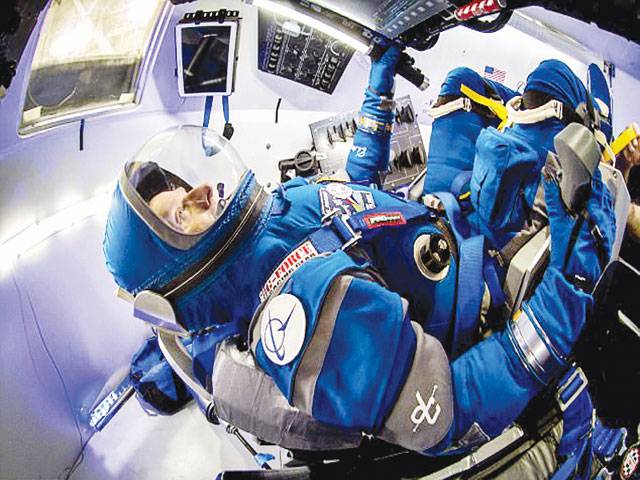FLORIDA-We now have our first glimpse at what astronauts may be wearing on SpaceX's crewed missions to the ISS next year.
Elon Musk today revealed a new space suit design on Instagram, adding that more details will be released in the next few days.
The suit is stylish and simple, with Musk admitting that its 'incredibly hard' to balance the look and its function.
The suit will be worn by Nasa astronauts for the commercial crew program when SpaceX starts launching people to and from the International Space Station.
SpaceX has been flying cargo capsules to the International Space Station for three years. The company is due to launch its first crewed mission with Nasa in June next year.
The firm also hopes to send two space tourists on a flight around the moon next year. It features accents and lines that make it more stylish than current designs. It also appears to be more tight-fitting than anything Nasa has produced.
'Worth noting that this actually works (not a mockup),' Musk wrote in a caption. 'Already tested to double vacuum pressure.'
The suit will be worn by Nasa astronauts for the commercial crew program when SpaceX starts launching people to and from the International Space Station.
SpaceX has been flying cargo capsules to the International Space Station for three years. The company is due to launch its first crewed mission with Nasa in June next year.
The firm also hopes to send two space tourists on a flight around the moon next year. SpaceX chose to develop their its suit for their astronauts in-house.
This is in contrast to the approach taken by Boeing which partnered with spacesuit specialist David Clark Company.
Its inspiration may have come from Jose Fernandez, the designer of costumes for Iron Man, Spider-Man, Batman and Captain America.
Last year, Musk revealed that he had contacted Fernandez to create a space suit.
Boeing unveiled its own version of a space suit in January.
The bright blue spacesuit will be worn by astronauts aboard the CST-100 Starliner.
It is designed to be comfortable while still providing functionality, with the helmet attached to the suit itself, touchscreen-sensitive gloves, and vents to keep the astronauts cool.
The 20 pound spacesuit is far lighter than other launch-and-entry suits, and its material allows water vapour to escape while keeping air inside.
According to Boeing, the Starliner spacesuit is roughly 40 percent lighter than other suits.
But, the trim design still meets Nasa’s safety and functionality requirements.
‘The most important part is that the suit will keep you alive,’ astronaut Eric Boe said.
‘It is a lot lighter, more form-fitting and it’s simpler, which is always a good thing.
Spacesuits are in short supply at Nasa and a replacement is still years away.
The bulky white spacesuits, currently worn by US and European astronauts when they explore outside the International Space Station, were developed more than 40 years ago and intended to last just 15.
Known as the Extravehicular Mobility Unit (EMU), they were introduced in 1981.
The two-piece semi-rigid suits are made of 14 layers of protective materials, including for thermal insulation and pressure resistance.
The mobile life support system has an oxygen supply, electrical power, water-cooling equipment, a ventilating fan and an in-suit drink bag.
Each suit has been refurbished over the years, with new features like glove warmers, improved helmet cameras and lights added.
But they have suffered an increasing number of problems, such as water leaking inside the helmets.
In 2013, the helmet of Italian space-walker Luca Parmitano's suit began filling with water, an emergency that risked drowning him.
He quickly ended his spacewalk and returned to the space station to remove his headpiece, rattled but unharmed.
'Complicated systems have more ways they can break, so simple is better on something like this.’
The new Starliner suit has zippers in the torso and materials in the elbows and knees that will give the astronauts a greater range of movement, and allow them to transition from standing to sitting more easily.
It also has a communications headset inside of the helmet, along with a wide visor for better peripheral vision.






